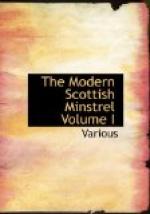But nae guile had she, and her sorrow away,
The wife of her Jamie, the tear couldna stay;
A bonnie wee bairn—the auld folks by the fire—
Oh, now she has a’ that her heart can desire!
In an earlier continuation of the original ballad, there are some good stanzas, which, however, the author had thought proper to expunge from the piece in its altered and extended form. One verse, descriptive of Robin Gray’s feelings, on observing the concealed and withering grief of his spouse, is beautiful for its simplicity:—
“Nae questions he spier’d
her concerning her health,
He look’d at her often,
but aye ’twas by stealth;
When his heart it grew grit,
and, sighin’, he feign’d
To gang to the door to see
if it rain’d.”
SONG.
Why tarries my
love?
Ah! where does
he rove?
My love is long absent from
me.
Come hither, my
dove,
I ’ll write
to my love,
And send him a letter by thee.
To find him, swift
fly!
The letter I ’ll
tie
Secure to thy leg with a string.
Ah! not to my
leg,
Fair lady, I beg,
But fasten it under my wing.
Her dove she did
deck,
She drew o’er
his neck
A bell and a collar so gay;
She tied to his
wing
The scroll with
a string,
Then kiss’d him and
sent him away.
It blew and it
rain’d,
The pigeon disdain’d
To seek shelter; undaunted
he flew,
Till wet was his
wing,
And painful his
string,
So heavy the letter it grew.
It flew all around,
Till Colin he
found,
Then perch’d on his
head with the prize;
Whose heart, while
he reads,
With tenderness
bleeds,
For the pigeon that flutters
and dies.
JOHN TAIT.
John Tait was, in early life, devoted to the composition of poetry. In Ruddiman’s Edinburgh Weekly Magazine for 1770, he repeatedly published verses in the Poet’s Corner, with his initials attached, and in subsequent years he published anonymously the “Cave of Morar,” “Poetical Legends,” and other poems. “The Vanity of Human Wishes, an Elegy, occasioned by the Untimely Death of a Scots Poet,” appears under the signature of J. Tait, in “Poems on Various Subjects by Robert Fergusson, Part II.,” Edinburgh, 1779, 12mo. He was admitted as a Writer to the Signet on the 21st of November 1781; and in July 1805 was appointed Judge of Police, on a new police system being introduced into Edinburgh. In the latter capacity he continued to officiate till July 1812, when a new Act of Parliament entrusted the settlement of police cases, as formerly, to the magistrates of the city. Mr Tait died at his house in Abercromby Place, on the 29th of August 1817.




